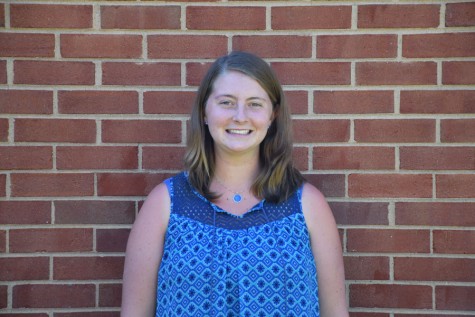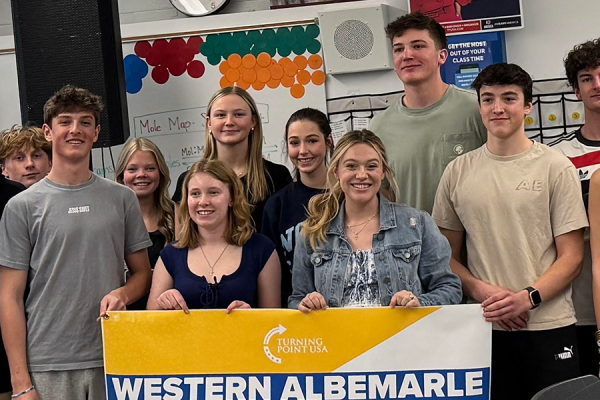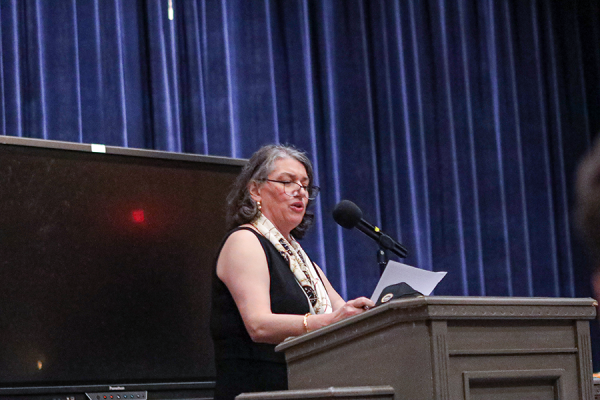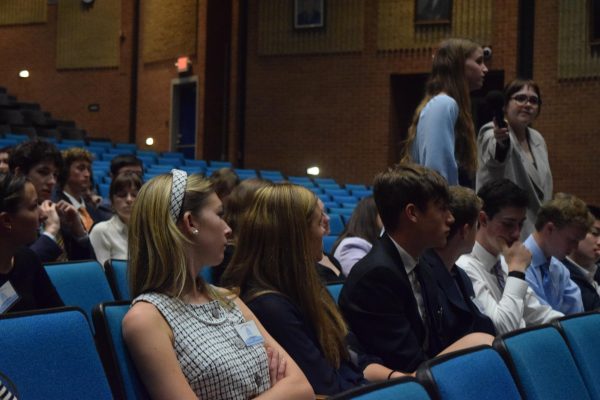The Girls with the Accents: Three WAHS Exchange Students Share Their Perspectives on America
October 9, 2015
“American high school is actually similar to how it is shown in the movies,” said Pauline Gilbert, one of the newest members of the senior class, “Well, I haven’t seen anyone singing or dancing on the cafeteria tables.” She then laughed before adding, “Or at least not yet…I would not be surprised if it actually happened.”
Originally from Romorantin, a small village in the center of France, Pauline is currently spending the year as an exchange student, fully immersing herself in the American life by living with a host family and attending Western Albemarle High School.
Western has hosted a fair amount of exchange students through the years, but this is the first time in recent memory that there have been so many foreign students at once; along with Pauline, junior Anna Fantozzi hailing from Santa Marinella, Italy and sophomore Luisa Hamann from Hannover, Germany arrived in August and are beginning to get used to their new lives here in Crozet, Virginia.
The girls were all eager to share their stories and opinions. The concept of school newspapers has apparently not quite made it’s way across the Atlantic yet, so for all three of them, it was their first time being interviewed (albeit with a student reporter).
Just as it’s what many of our students would likely miss the most if they left America, the three girls all immediately agreed on their absolute favorite thing about school here so far. “The football games,” Anna said enthusiastically, “There is nothing like them in Italy. It’s such an exciting sport to watch. And the school spirit is great.”
“And another thing I love are the people. The people here are very, very nice,” Pauline said, “Whenever I go to order food or say something, people hear my accent and want to know where I’m from. They are always very interested in my story, and are always very kind.”
“Americans are so friendly,” agreed Luisa, “Germans are usually a lot more direct. And I love all of the compliments here. In Germany, people just don’t give as many compliments.”
Yet while there are many things they have come to love about America, the girls admit to preferring some things better “the European way”. One glaring example, they said, are our portion sizes. “At restaurants here, the meals are big enough to share,” commented Luisa. “And there is a lot more meat, especially chicken.”
“I think another big difference is the style of teaching here,” Anna added, “The teachers in Italy are very, very old and have lots of experience, and they spend more time explaining things to the students, instead of always letting the students give their opinions. I think this is more efficient, because we can learn more in less time, but it is not as interesting.”
Pauline, however, disagreed. “I like how here, the teachers are more supportive. They are always very patient and kind with the students, and they feel more like my friends than my French teachers did.” Luisa and Anna chimed in, agreeing that American teachers are generally friendlier than their European counterparts.
Aside from school life, Pauline, Anna, and Luisa’s daily routines here are not drastically different from how they were in Europe; every morning they still must get up, make their lunches, and get to school before the bell rings – but here there are definitely some differences in terms of food and transportation.
“When it was warm in Hannover, I could ride my bike to school, but in the winter I would always ride the public bus,” said Luisa, “And for breakfast I would have ‘brötchen’ from the bakery, which are similar to rolls, but better…I miss the German bread a lot.”
“Yeah, on the weekend, my dad would buy fresh croissants from the bakery,” Pauline said, “Then during the week, I would go to boarding school in a different city. For lunch we would always have one hour, sometimes two, when we could leave the school.”
“In the morning I used to wake at a quarter past six, and then I would go to the bus stop. My family lives pretty far from everything. Except for the monks…we live close to the monks,” Anna said with a laugh, “And then I would have to wait for the bus. In Italy I took the public bus that came from Rome, but it would come at a different time everyday, so we never knew when it would arrive. The real problem, though, was getting home – my friends and I would always miss the bus after school. So every day, we would try to escape class early and run like crazy to catch it in time. Sometimes we would still be too late, and we would be running behind the bus like Forrest Gump, but the driver never stopped for us. So before I came to America, my biggest fear wasn’t about the language or the school or making friends, but about the buses. I always had nightmares of myself chasing the American school buses.”
As Pauline pointed out, part of her motivation to come to America was because of the American Dream. “It is very much alive in the minds of European students,” she said, smiling, “I mean, the TV shows and movies we watch, the songs we listen to, many books we read…they’re all American. And so everyone has an opinion of how things are in America; they say, ‘It’s like this, it’s like that, you will see.’ But I wanted to be able to say, ‘This is how America really is. I know because I have been there.’”
What the girls are gaining from their cultural experience will become more apparent in time, but typically exchange students return to their native countries with a new perspective of the world, often feeling more independent and responsible.
“I am already starting to see the changes in my myself,” concluded Pauline, “Before I came, I’ve never felt very proud of myself, because I’ve never done anything really courageous. But now I feel proud of myself every day, and it is a very good feeling. I am without my parents, living in a new country and speaking a different language…sometimes I can’t believe I’m doing this. It’s hard, but so far it has been a very good experience.”














